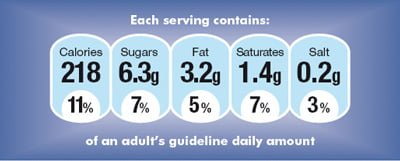
Consumers have higher expectations than ever before. They want products to match these expectations. They also want accurate, up-to-date and useful information about what they buy. In short, consumers want the facts. This growth of consumer power is known as consumerism. In the area of fast moving consumer goods(FMCG), marketing has become a specialised and complex process. When developing products, organisations try to meet the needs of their consumers as fully as possible. This is vital if they want to do better than their competitors. This process of development around the needs of its consumers is called marketing orientation.
Nestlé’s business principles
Nestlé is the world’s biggest food and beverage company. It wants to be known as a ‘Respected, Trustworthy, Food, Nutrition, Health and Wellness Company’. Its actions are guided by a series of business principles.
Market research by Nestlé showed that its customers have a genuine and growing interest in information about its brands. In particular, consumers want more information about what they eat and drink. They felt this information should be supplied as part of the product.
This case study shows how market research has helped Nestlé to exercise corporate responsibility. It has done this by promoting healthy eating. The company played an important role in the development of ‘Guideline Daily Amounts’ (GDAs). These were developed by the Institute of Grocery Distribution (IGD), a trade association. Leading manufacturers and retailers, including Nestlé, took part.
Corporate responsibility through food labelling

Nutritionists and scientists provided the details of the nutrients that the average person needs to consume each day. The GDAs were produced in line with published government recommendations. Having developed the guidelines, the next step was the most difficult. Consumers wanted the information in a form they could easily understand. So the GDAs were added in a visual form to the front of packs. This meant that consumers could easily understand and use the information. Nestlé and other major manufacturers chose to use symbols to help consumers make more informed choices.
The symbols were designed to show the amount of calories, sugars, fat, saturates and salt in products. The consistent use of these symbols helps consumers to understand the GDAs. This means they can make choices quickly and easily about their daily diets. Placing the GDA symbols on the front of packaging is a powerful tool. It gives consumers the information they need immediately. This also supported the market research data which showed that consumers’ buying habits were influenced by a desire to eat healthily.
Ethics and business principles
Ethics
In business, ethics are the moral principles or values held by those within the organisation. These support and influence its decision-making. In order to be ethical in its operations, Nestlé’s decisions are guided by a series of business principles. In order to be ethical in its operations, Nestlé’s decisions are guided by a series of business principles. The well-being of consumers and employees is central to its business principles. For example, one principle is: ‘Nestlé recognises that its consumers have a sincere and legitimate interest in the behaviour, beliefs and actions of the Company behind its brands in which they place their trust, and that without its consumers the Company would not exist.’ Market research showed that consumers wanted to be better informed so they could make the right food choices for their health. The development of GDA labelling on the front of packs shows Nestlé’s consumers that the company is concerned about their health.
Business principles
Nestlé has also developed a series of business principles focused on communications with consumers. Two of these are:
- ‘Nestlé consumer communication should reflect moderation in food consumption and not encourage overeating. This is especially important regarding children.
- Nestlé consumer communication must [match the desire for] healthy, balanced diets. Our advertising must not imply the replacement of meals with indulgence or snack foods, nor encourage heavy snacking’.
By making the symbols immediately visible on the front of packs, Nestlé helps consumers to recognise and understand the nutritional content of the food they buy at a glance. This has had a positive impact on the reputation of the company. Consumers can see that Nestlé is behaving responsibly and is communicating effectively with them.
As a responsible Nutrition, Health and Wellbeing company, Nestlé is keen to promote and facilitate healthy living for its own employees. Nestlé linked the launch of Guideline Daily Amounts on the front of packs with an internal communication programme to inform employees about GDAs and the labelling system. This helped to motivate employees as it showed that Nestlé cared for their well-being and that of their families.
Creating Shared Value
Nestlé’s business principles and its approach to corporate responsibility were the beginning of what is known within Nestlé as ‘Creating Shared Value’. The process of Creating Shared Value has two important elements. It links the needs of shareholders and consumers to the need to respect people and the environment. Creating Shared Value means that Nestlé looks at the impact of each corporate activity on the wider environment. This attitude is at the heart of everything that the company does. This process starts when products are sourced from various parts of the world. It continues through the manufacturing and distribution of products. It ends when products are distributed to customers (for example, supermarkets) and ultimately sold to consumers (the public).

Each step in this value chain could have harmful consequences if not managed properly. For example, without sustainable agricultural practices the natural resources of farms worldwide might be damaged. By embedding corporate responsibility in its business practices in this way, Nestlé is able to contribute positively to societies across the globe.
The need to be responsible

Nestlé’s business principles are central to its framework for corporate responsibility. This framework also enables it to Create Shared Value with suppliers, partners, customers and consumers across the world. Corporate responsibility involves Nestlé doing more than the regulations and laws require. This means that the individuals and organisations it does business with have more trust and confidence in Nestlé. Using a series of business principles has helped Nestlé to link good practice with good business. Undertaking business responsibly is not always easy. There are many costs to consider. In the short term, providing consumers with accurate information in the form of front-of-pack GDAs could mean that consumers might choose another company’s product. Competitors might look for chances to take sales from the company during this period of change.
Benefits of responsible business
However, Nestlé feels that it is important that the company is seen to act responsibly and is responsive to consumers’ needs. Market research had clearly identified that consumers wanted more information, so they could make better decisions for themselves. By providing this information Nestlé has positioned itself favourably in the minds of consumers, which means that they will react favourably to its products. This has a long term positive impact on the company’s reputation.
Corporate business principles as a form of social auditing

The purpose of corporate business principles is to influence how employees within the organisation behave. These principles and policies are given to everybody at Nestlé. These principles provide clear guidelines for employees. This helps them to make choices which reflect the company’s ethical stance. As well as creating value for the company, Nestlé also creates value for the societies it serves. The business principles which determine how it does business create a framework for auditing the activities of the organisation. This auditing ensures that the business Creates Shared Value. Nestlé emphasises the importance of evaluating its activities against the business principles. This makes it possible to measure the behaviour of the business in ethical and socially responsible terms.
Communication
Measuring the effectiveness of communications

Nestlé spent considerable sums of money on a consumer communication campaign on GDAs. This was to make consumers aware of the new labelling system so that they would use it when choosing what to eat and buy. The campaign was evaluated by a market research company to help Nestlé understand how well the communications with consumers had worked. It also helped assess how informing consumers about product content actually influences what they buy. Monitoring is very important for Nestlé to assess the impact of its business practices both on society and on its contribution to Creating Shared Value.
Conclusion
This case study demonstrates that Nestlé’s approach to responsible business is good business. By focusing on the development of GDA labelling, it shows how a market-orientated business can use its business principles to satisfy the needs of consumers. In the longer term, it is good for the business since it helps to Create Shared Value and allows Nestlé to connect positively with its consumers.
